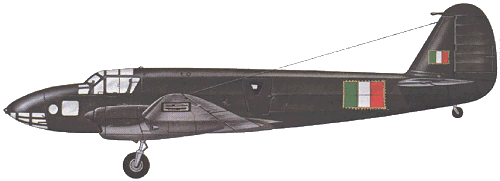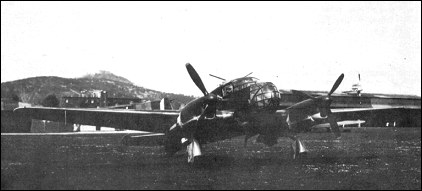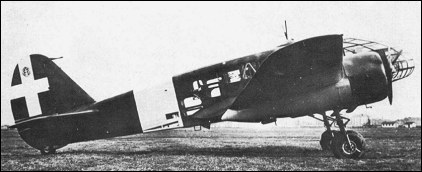|
| At the 1935 Milan Exhibition there
appeared the prototype of the Caproni
Bergamaschi Ca.306 Borea (north
wind), a six-passenger low-wing transport.
Although built only in small numbers,
the Borea was important as the
progenitor of a range of light twin-engine
aircraft manufactured for a
wide variety of roles. The first of these
was the aptly-named Ca.309 Ghibli
(desert wind), 78 of which were built
for use in Libya. The military versions
were used as light transports or reconnaissance
bombers with a lengthened
glazed nose, bomb racks, cameras,
and with armament comprising three
7.7mm machine-guns.
Another model featured a fixed forward
firing 20mm cannon. Seven
squadrons equipped with Ghiblis
were operational when Italy entered
the war in 1940.
Developed in parallel with the Ghibli,
the Ca.310 Libeccio (south west
wind) was structurally similar to the
earlier machine, but was provided
with retractable landing gear and powered by two 350kW Piaggio
P.VII C.35 radial engines. Export
deliveries went to Norway, Peru and
Yugoslavia, and this last nation also acquired
12 more under the designation
Ca.31 Obis; this variant differed primarily
by having an unstepped extensively-
glazed nose.
The prototype of the Ca.310bis
served as a development aircraft for
the following Ca.311. As built they
were similar to the Ca.310bis, but most
were later modified by the introduction
of a stepped windscreen, then
being redesignated Ca.311M. Defensive
armament of this version comprised
a Caproni Lanciani turret with a
single 7.7mm machine-gun,
complemented by one machine-gun in
the port wing root and another firing aft
through a ventral hatch. A modified Ca.310 with two Isotta-Fraschini Asso 120
IRCC 40 engines served as the Ca.313
prototype, first flown on 22 December
1939, but France had already confirmed
an order for 200 of these aircraft
on 1 October, followed closely by British
and Swedish orders for 300 and 64
respectively. However, Italy's entry
into the war prevented delivery of any
of the British machines and France received
only five Ca.313F models, the
remainder being diverted to the Regia
Aeronautica.

Most extensively built version was
the Ca.314. Variants included the Ca.314A or Ca.314-SC (Scorta), a convoy
escort/maritime patrol aircraft, the Ca.314B or Ca314-RA (Ricognizione Aerosiluranti)
torpedo-bomber and the ground-attack Ca.314C.

| MODEL | Ca.309 |
| ENGINE | 2 x 200hp Alfa Romeo 115-II |
| WEIGHTS |
| Take-off weight | 2695 kg | 5941 lb |
| Empty weight | 1745 kg | 3847 lb |
| DIMENSIONS |
| Wingspan | 16.20 m | 53 ft 2 in |
| Length | 13.30 m | 44 ft 8 in |
| Height | 3.25 m | 11 ft 8 in |
| Wing area | 38.70 m2 | 416.56 sq ft |
| PERFORMANCE |
| Max. speed | 250 km/h | 155 mph |
| Cruise speed | 210 km/h | 130 mph |
| Ceiling | 4500 m | 14750 ft |
| Range | 670 km | 416 miles |
| Dan Borg, e-mail, 01.03.2018 10:58 Hello. I was wondering if anyone could tell me if the Caproni 311 /12 /13 /14, were ever "seen" in the skies over Malta? Did they do any ground attack, light bombing, or recon over Malta, or did their speed and light armament prevent that? I do not want to build one if it never saw action over Malta. My grandparents were born /raised there, but emigrated to the U.S. in 1920's. Nevertheless, they lost a number of relatives in the bombings and rampant illnesses due to the bombings and convoys that only could resupply few and far between. Thanks for any assistance. Dan Borg reply | | martijn, 10.12.2015 16:40 this should be seperated in 4 pages the plane are quite divers . reply | | Mannlicher, e-mail, 18.06.2013 12:33 Did the ca314 defend the sicily in 1943? reply | | Barry, 11.02.2013 14:15 A total of 84 Ca313S were delivered to Sweden by early 1941. These were designated by the Swedish authorities as D16, S16, T16 and Tp16S which were repectively, bomber, maritime reconnaissance, torpedo bomber and transport. reply | |
| | dasunda, 20.06.2011 05:37 However the Ca.310 /311 offered ad excellent job as observation aircraft and remained in service for the whole war. reply | | Bob, e-mail, 28.01.2010 22:31 Hi, I'm building a model of the CA 311. How did the bomb bay doors open? Was it a single door on each side opening from the sides or were the doors hinged from the sides with a hinged section on each door as well? reply |
| LL, 06.05.2008 22:53 It was a good patrol aircraft when there wasnt fighters around. So ended mostly fighting partisans and patrolling the sea and secundary duties like training, liasion and AAA training, in short a plane in search of a mission. It wasnt a good aircraft(appears 309,314 were better ones) and Capronis were probably the worse quality wise planes in Italian Industry well maybe at level of IMAN. Due to Fascist industrial corporativism the Fiat CR.25 an excellent plane much better than Capronis was only built in 10 while Caproni got 1000 built. Bizarrely Reggiane(from Caproni group) 2000 a good fighter was not build while the outdated Fiat CR.42 biplane was build until 1944(yeah they even sold it to the Luftwaffe) in 1500... reply | | Kris, 22.11.2007 16:40 What about the Wellington or the Fw 189? Those had lots of glass and were successful military aircraft... reply | | 3VI, e-mail, 16.10.2007 10:07 The Caproni 306-314 serie aircrafts were developed like civilian high performance planes (like many others in that period) and during WWII were used mainly for recon and liaison. A small number serviced as light bomber only to cope with chronical lack of first-line planes of Regia Aeronautica.
However the Ca.310 /311 offered ad excellent job as observation aircraft and remained in service for the whole war. reply | | Ken Holt, e-mail, 30.07.2007 18:52 I could never figure out why an aircraft used for military purposes would have so many windows along the fuselage. It looks more like a civilian transport than a bomber. I would be interested in how successful the aircraft was in military operations. reply |
|
Do you have any comments?
|
| 
COMPANY
PROFILE
All the World's Rotorcraft
|










20
reply